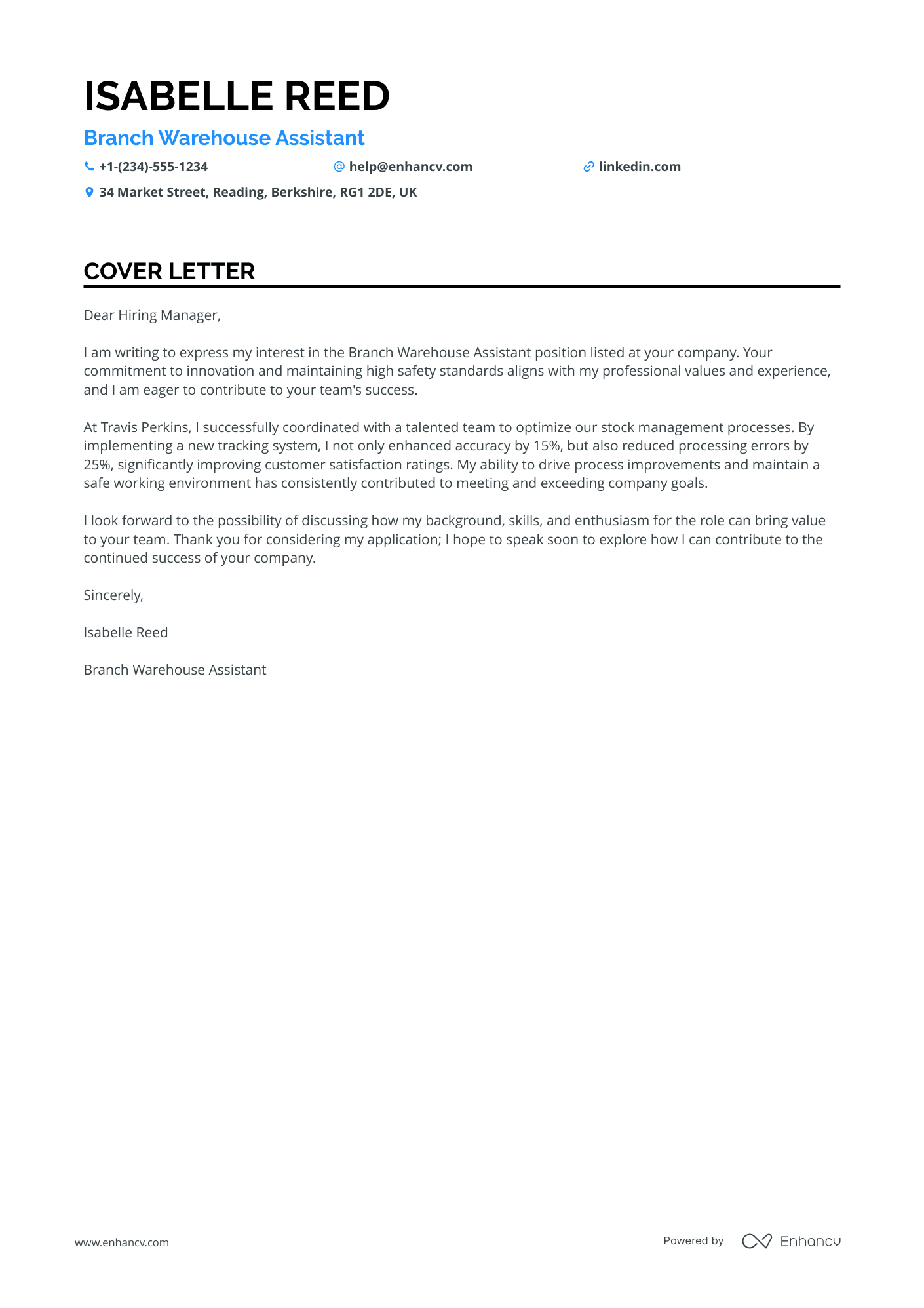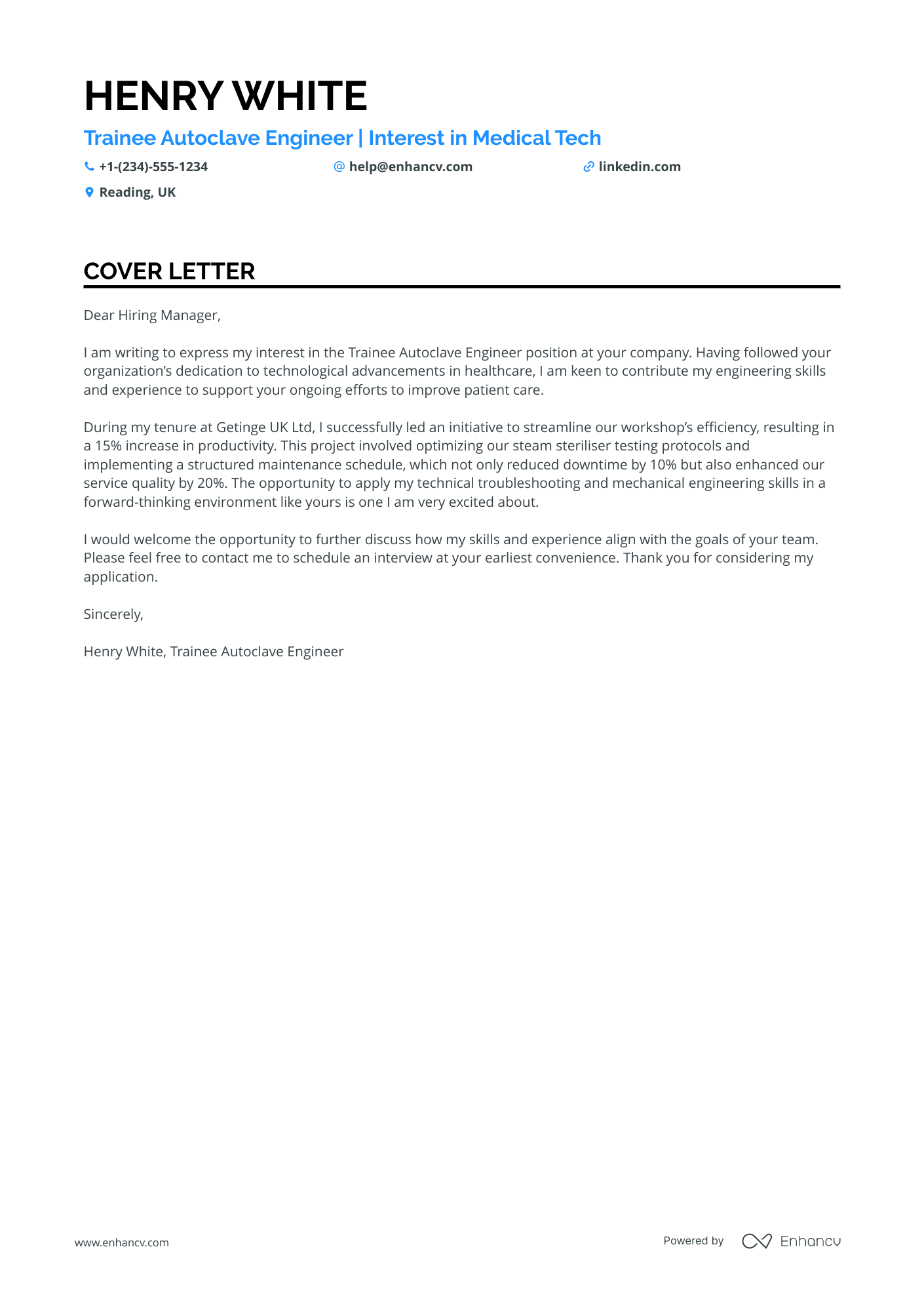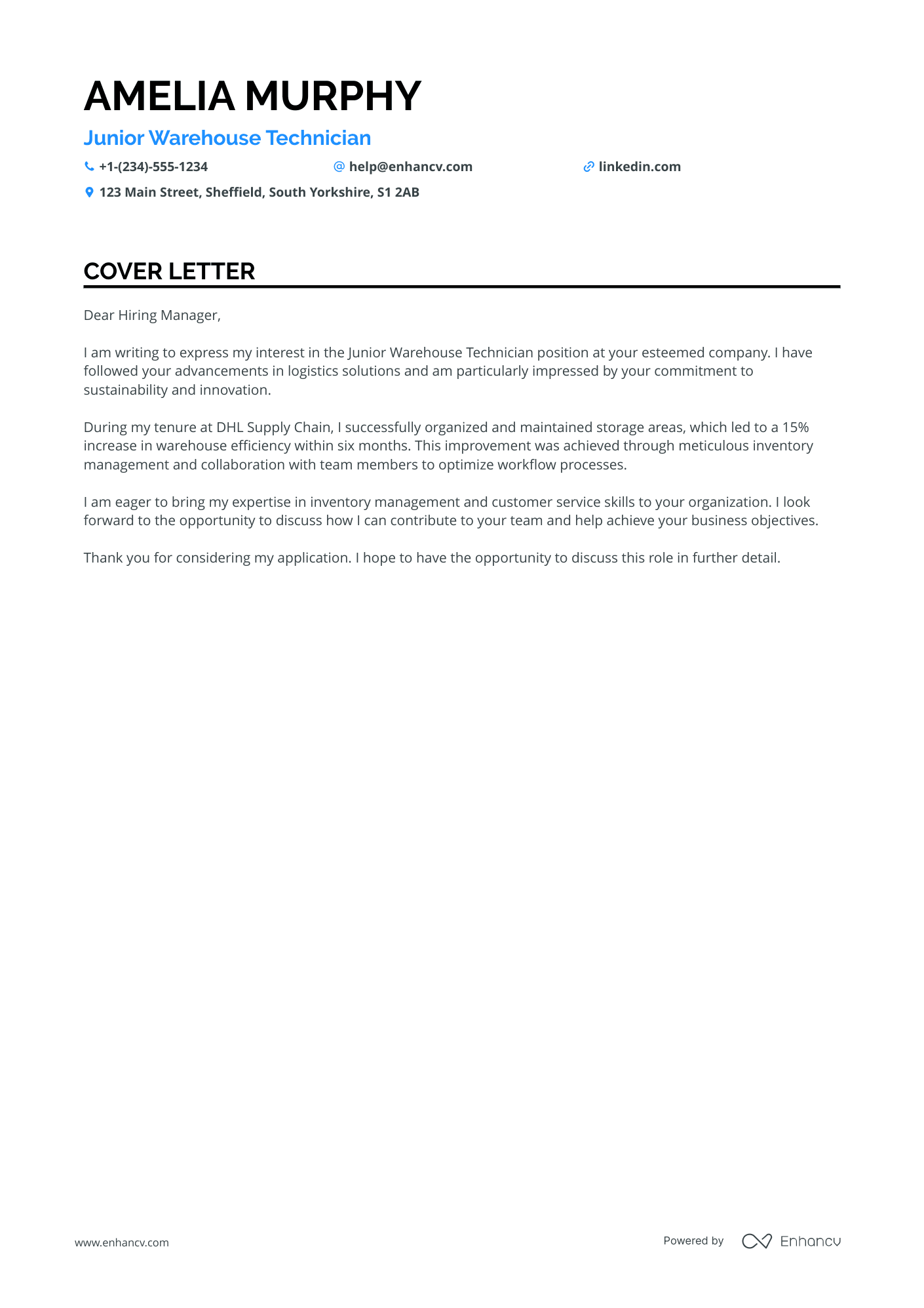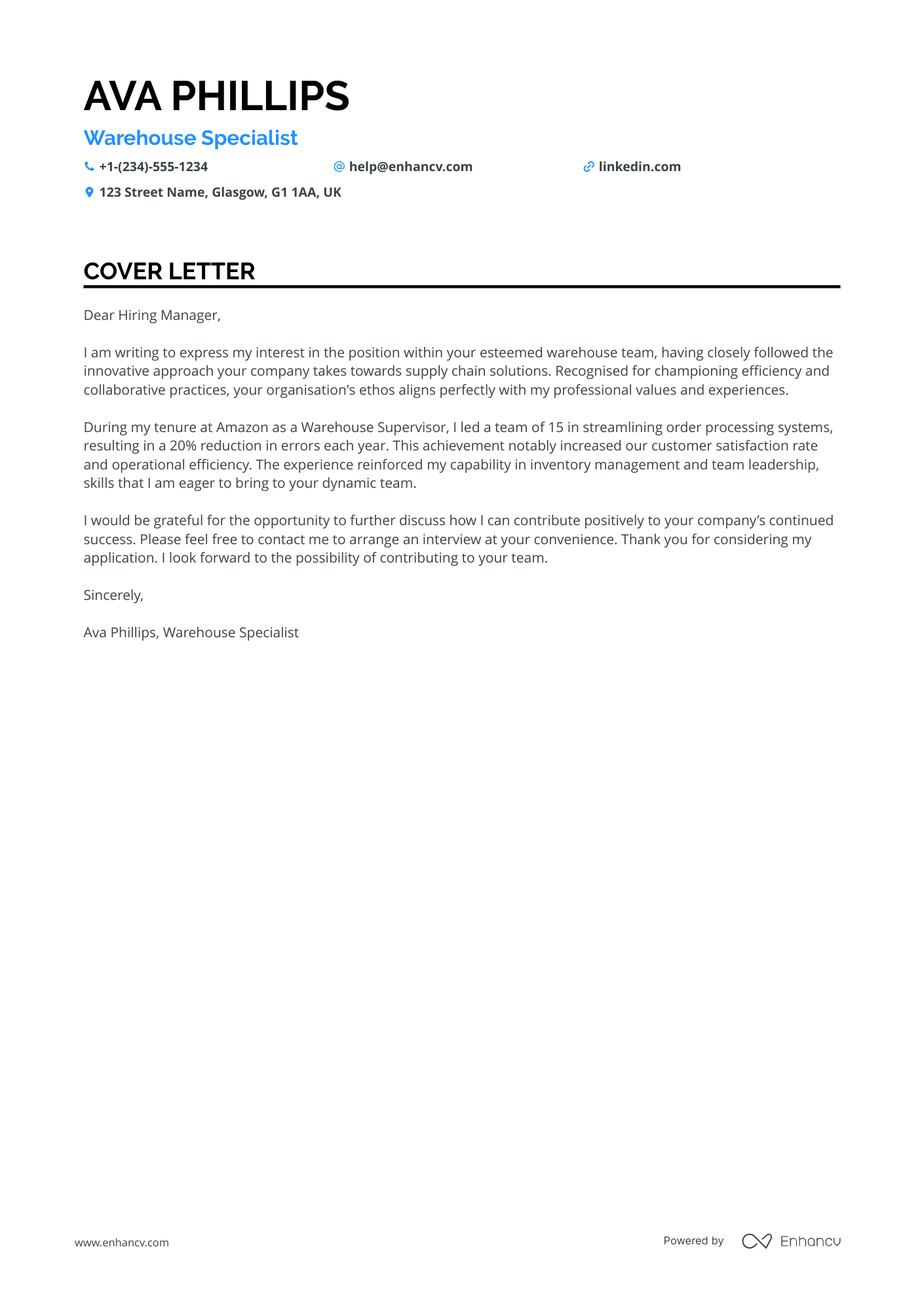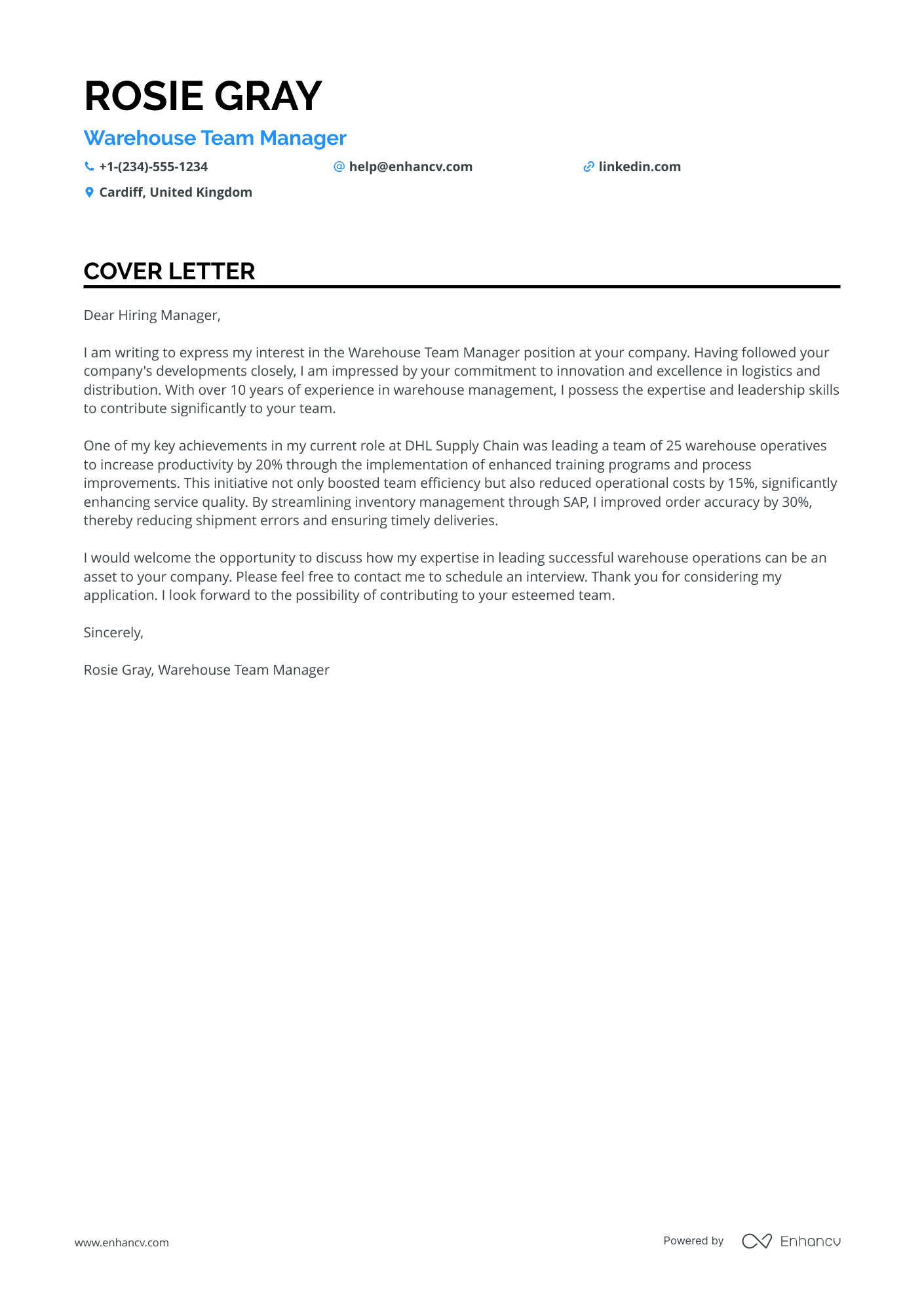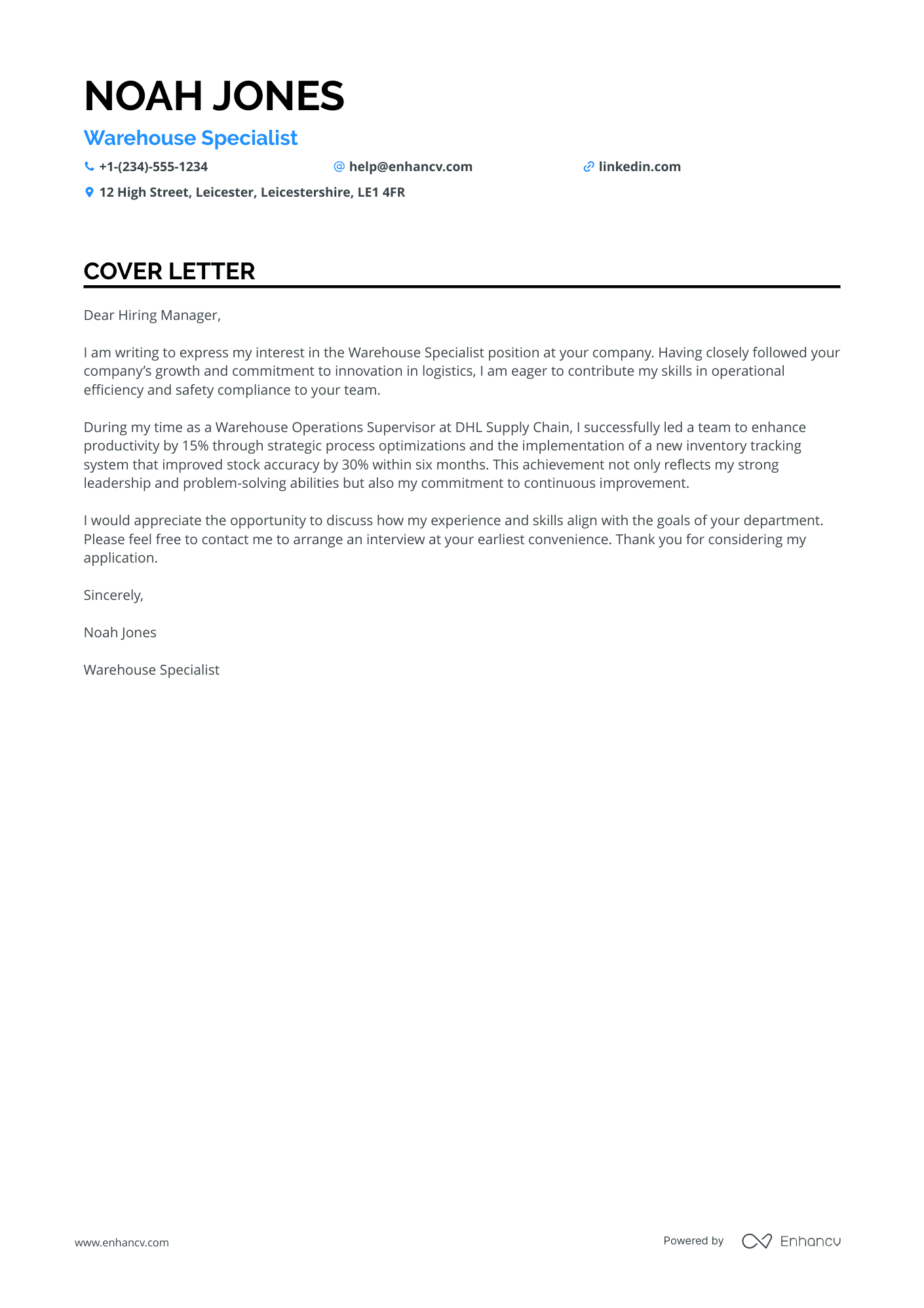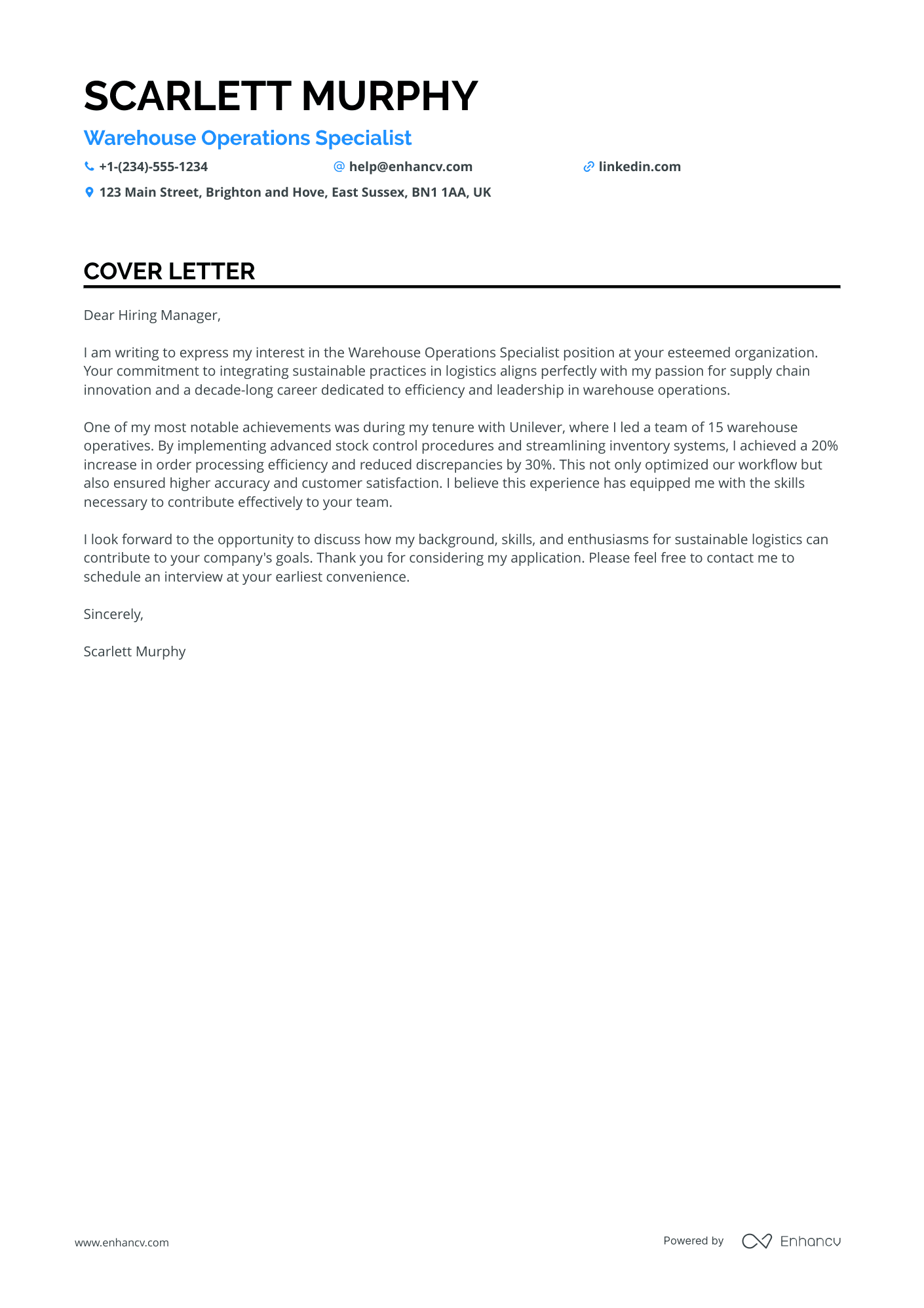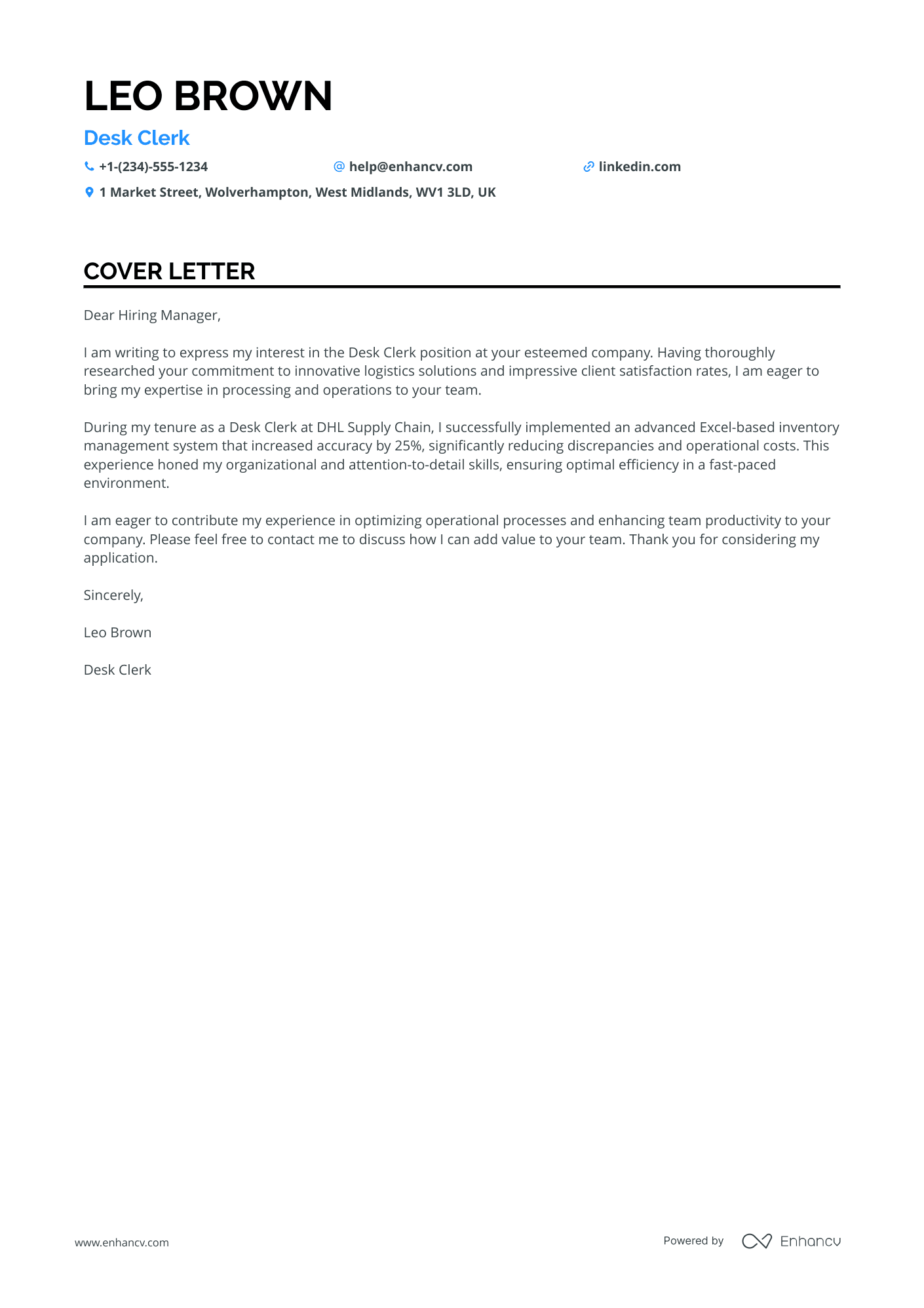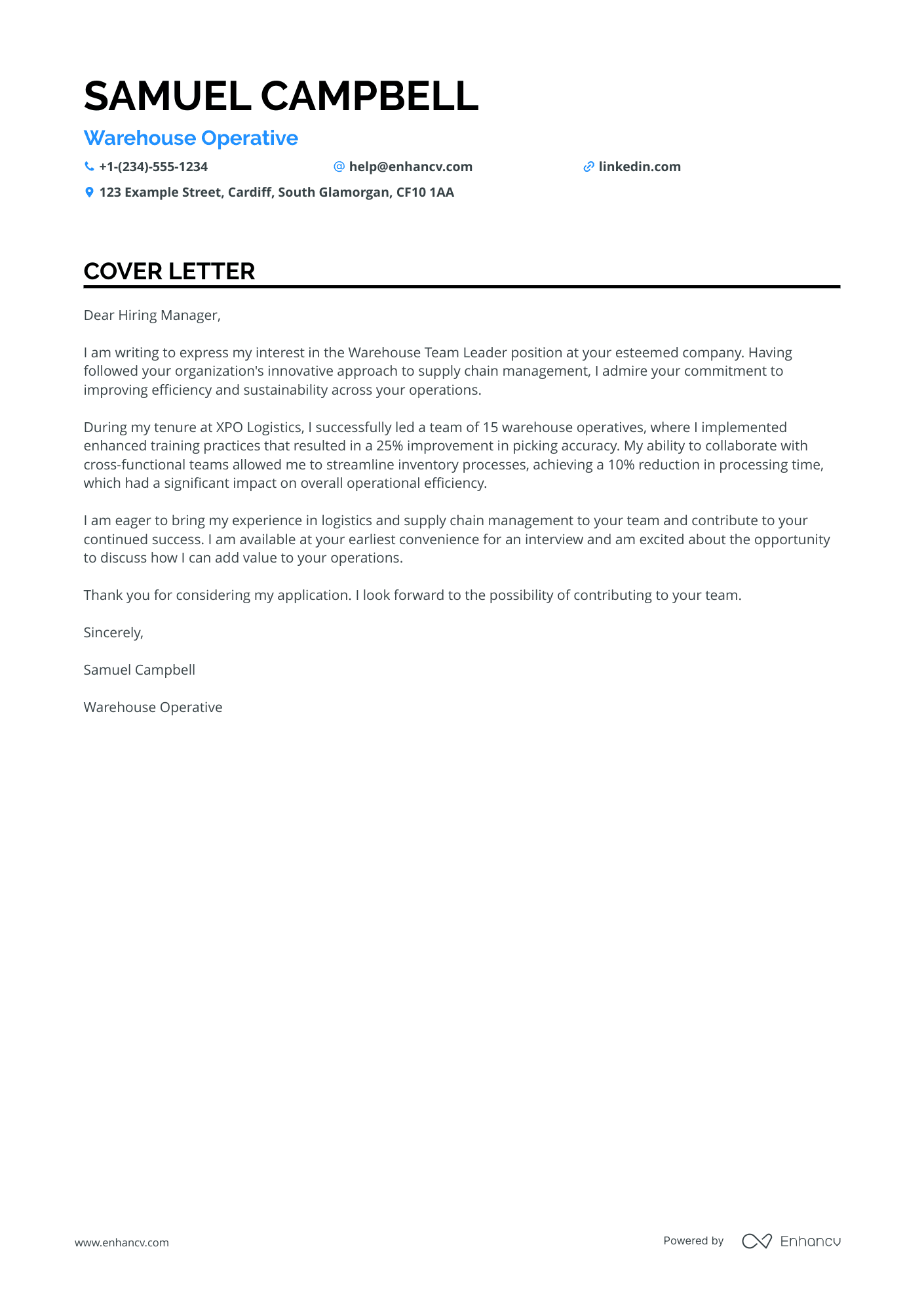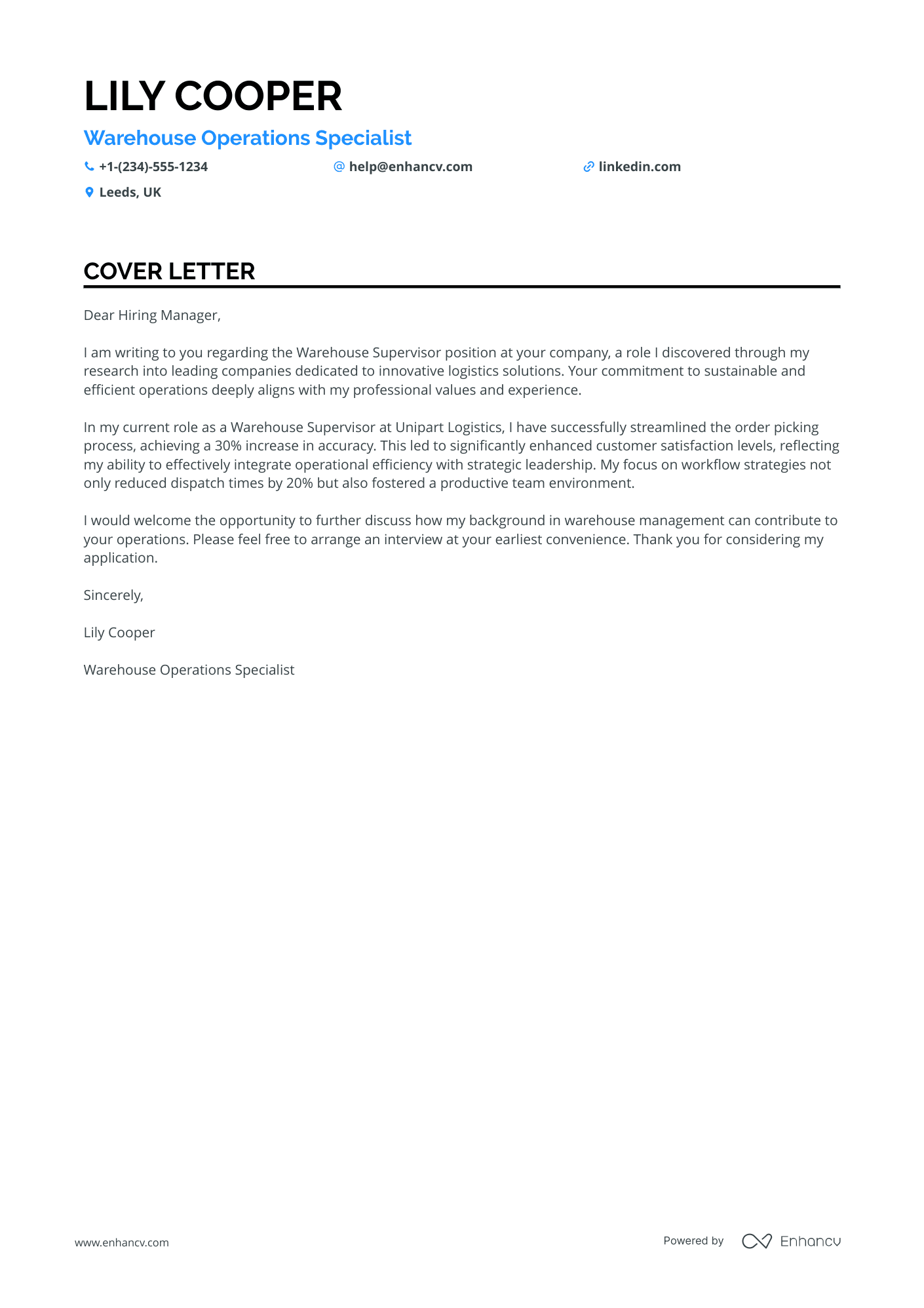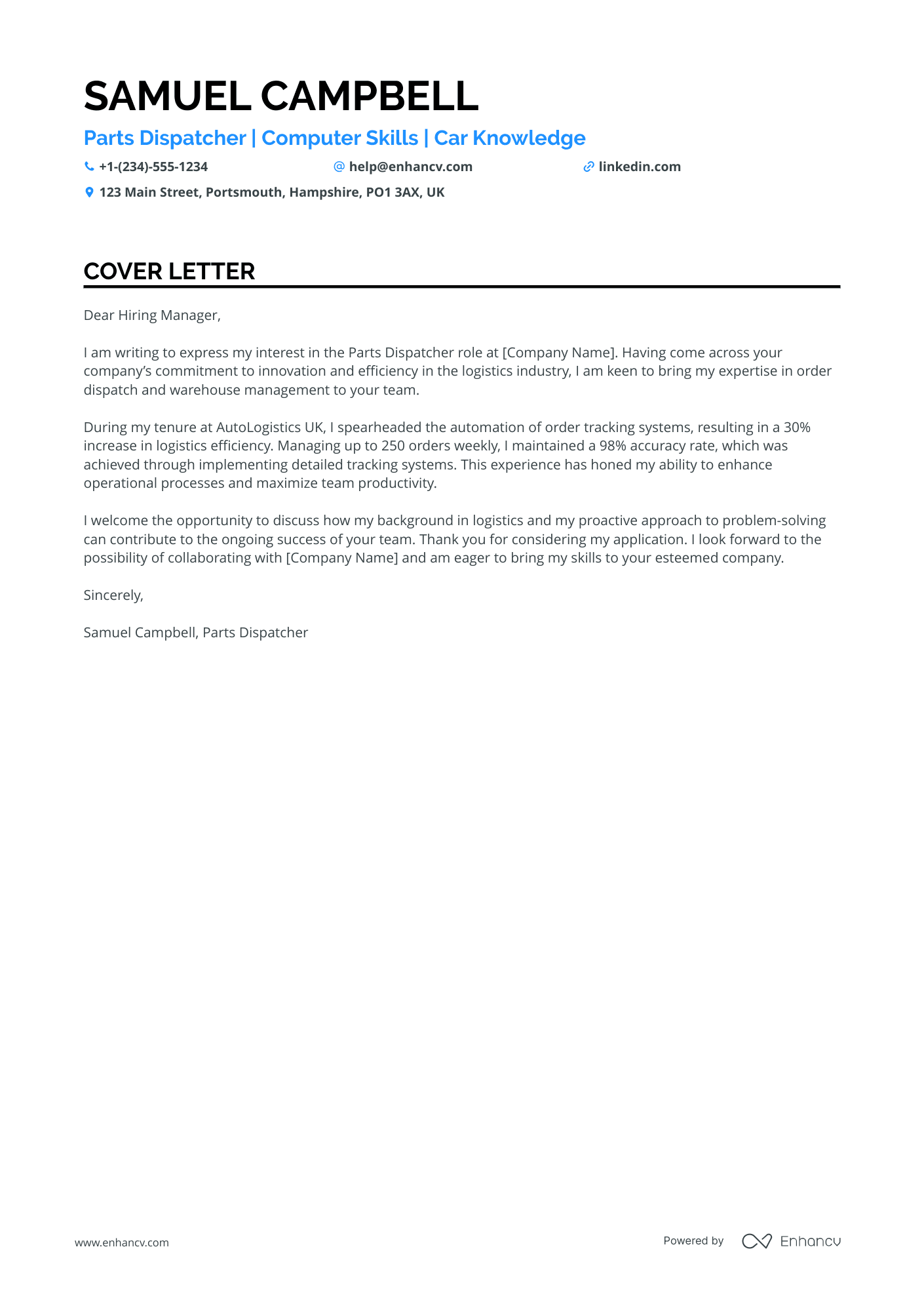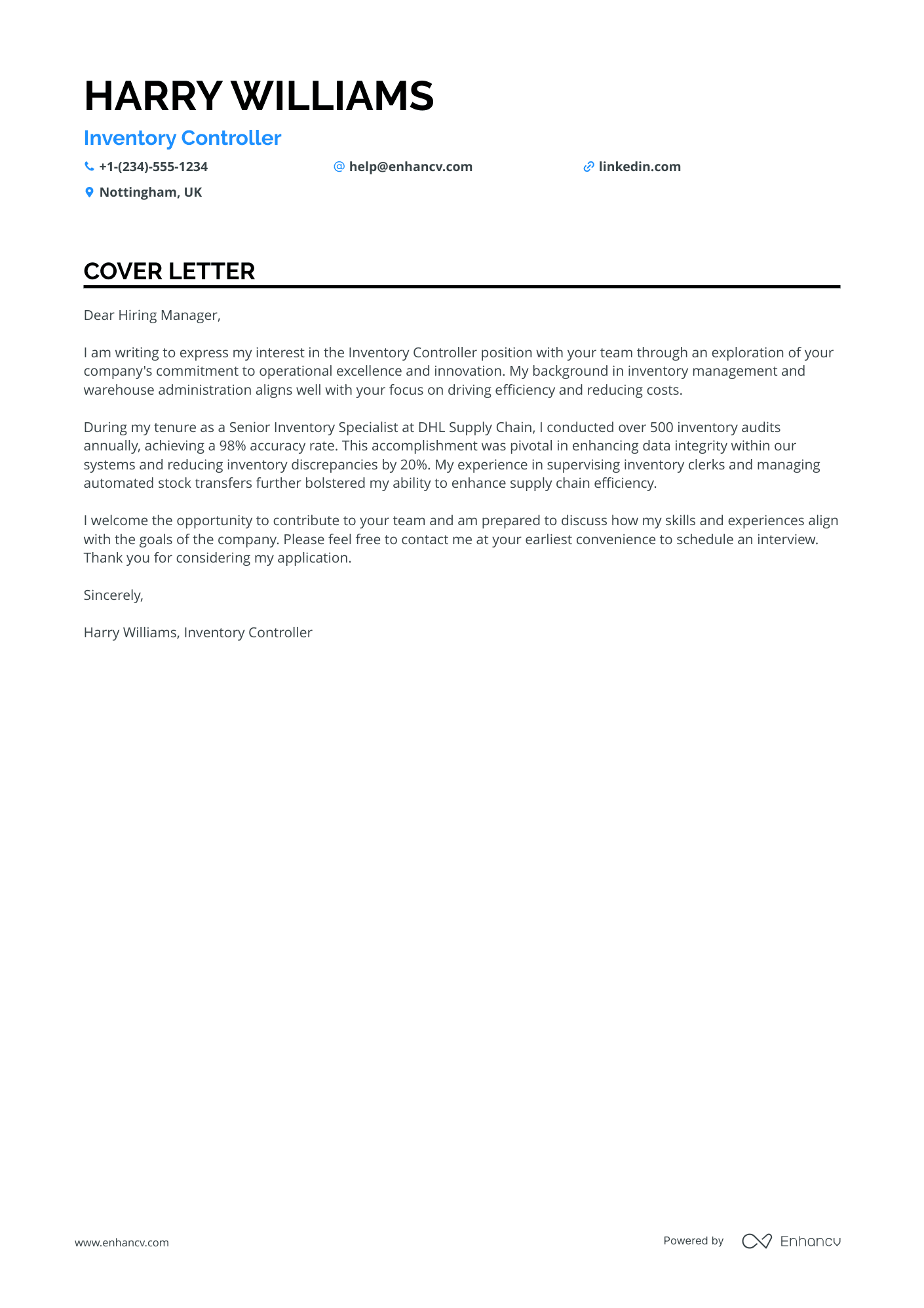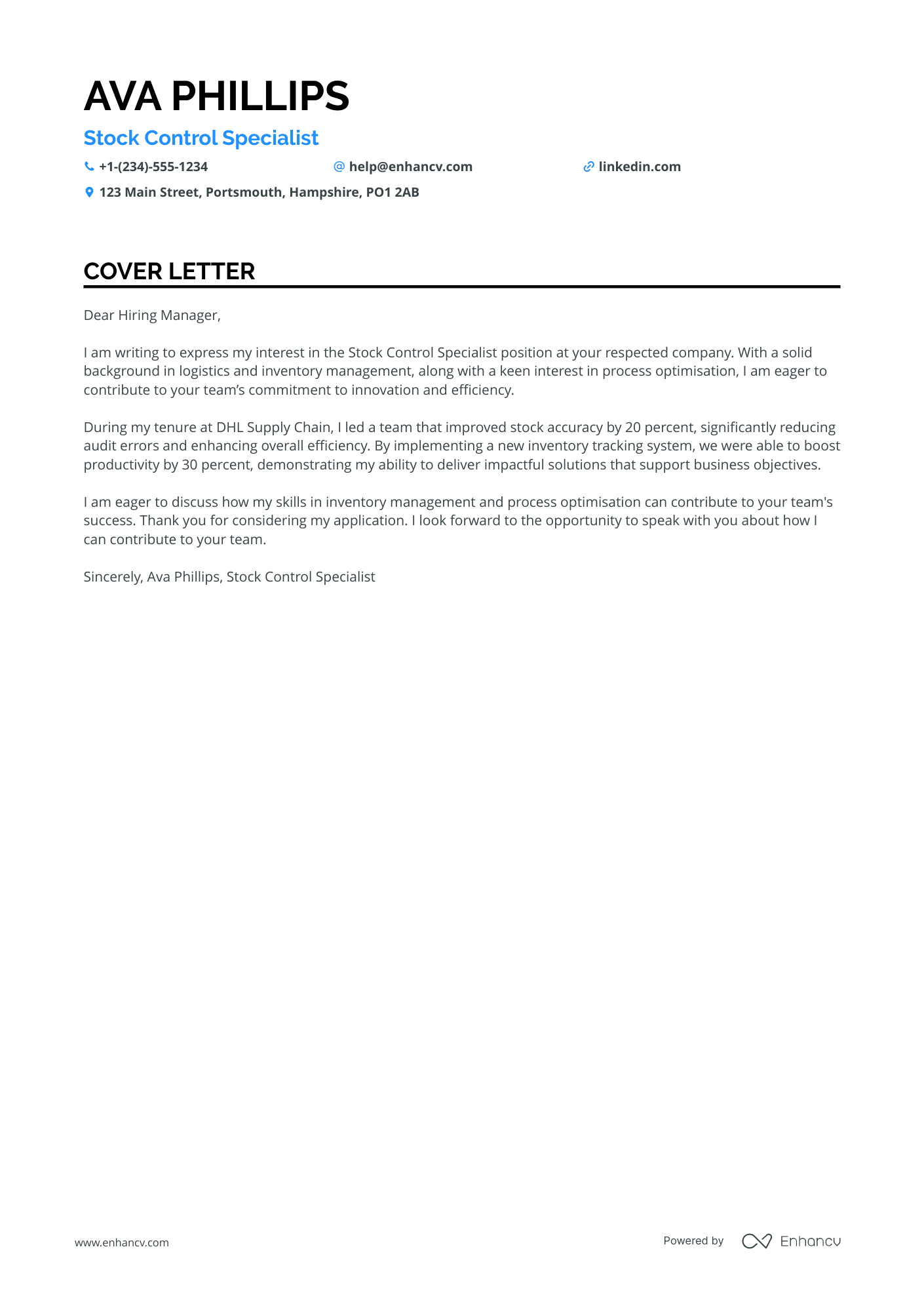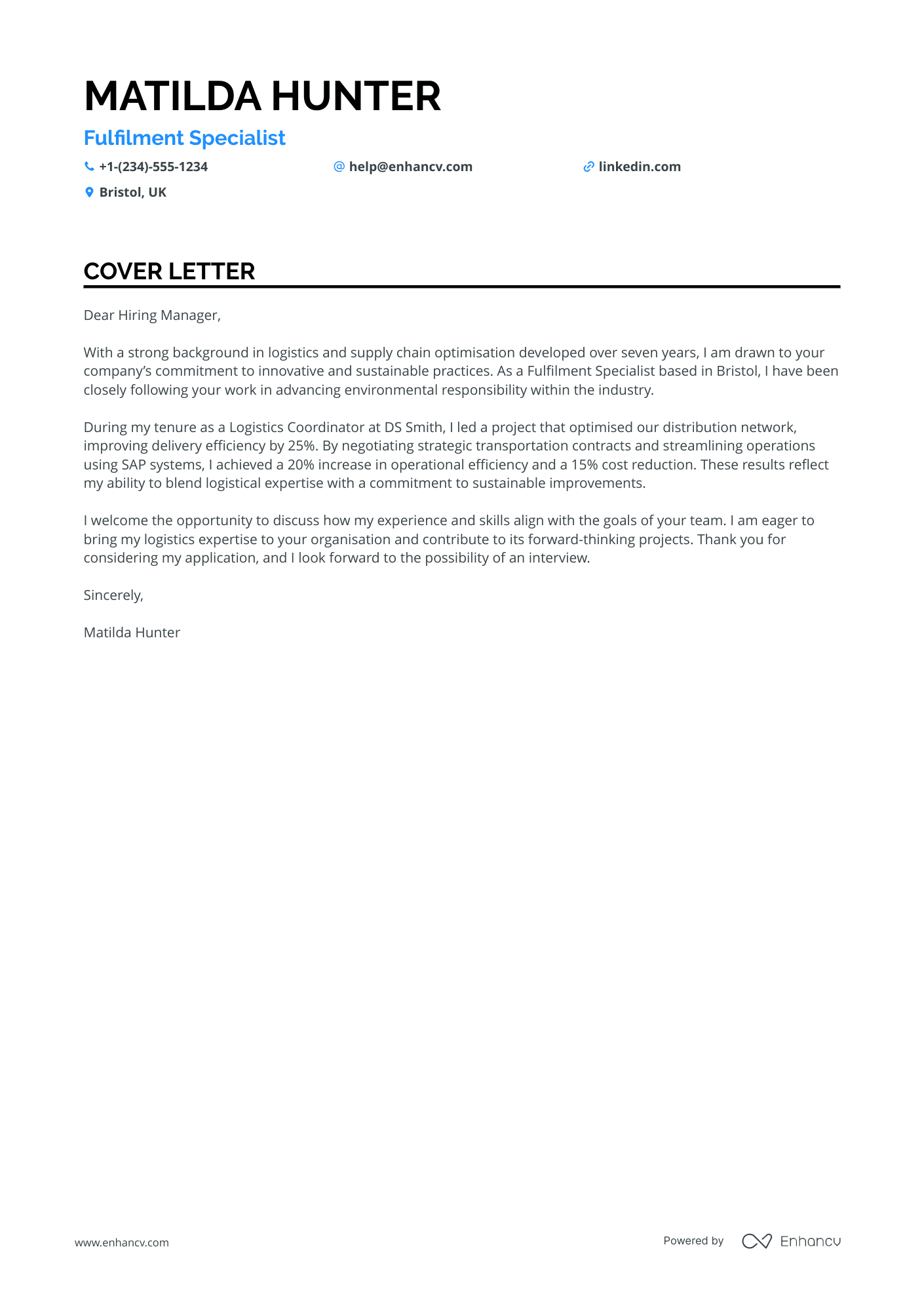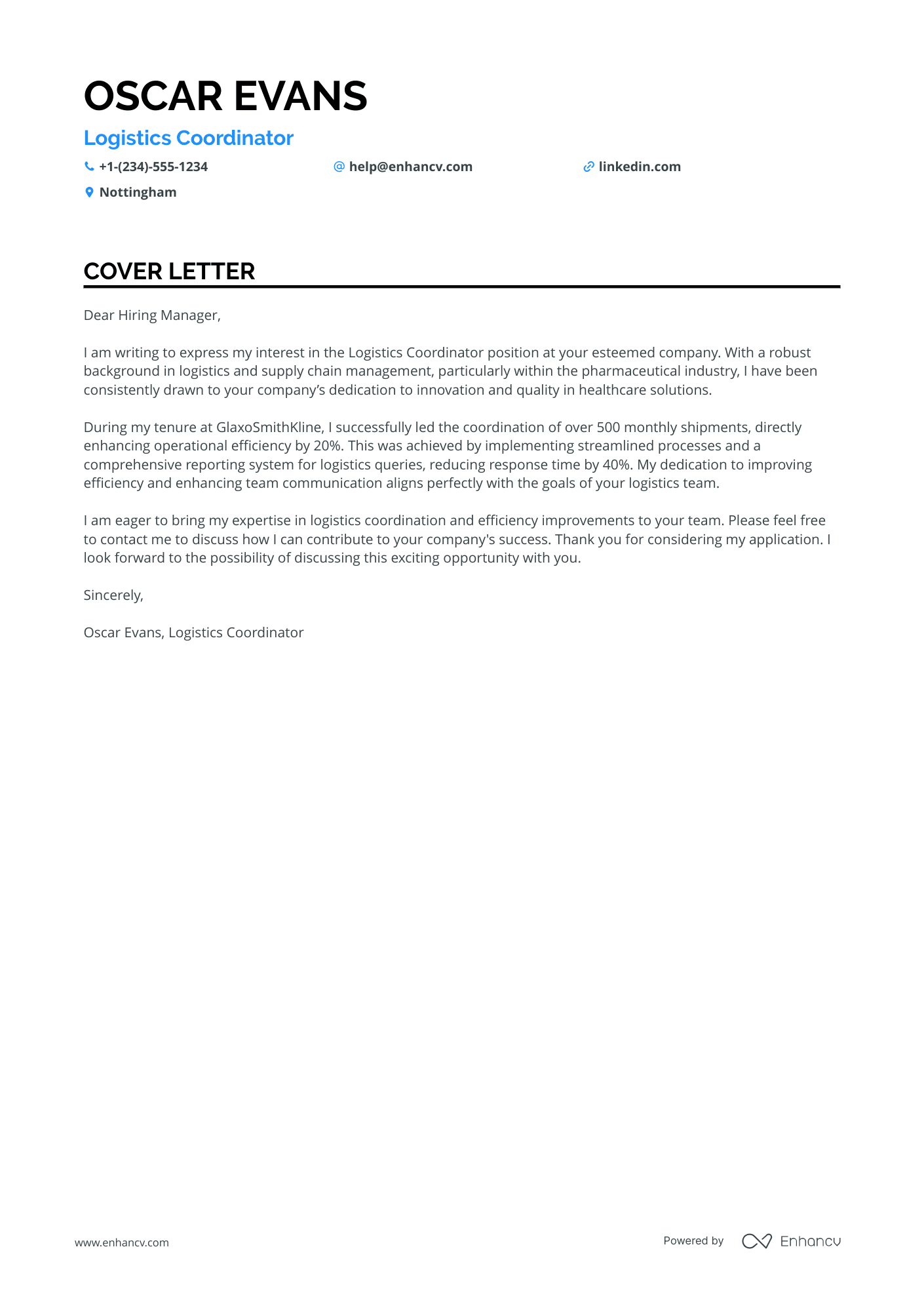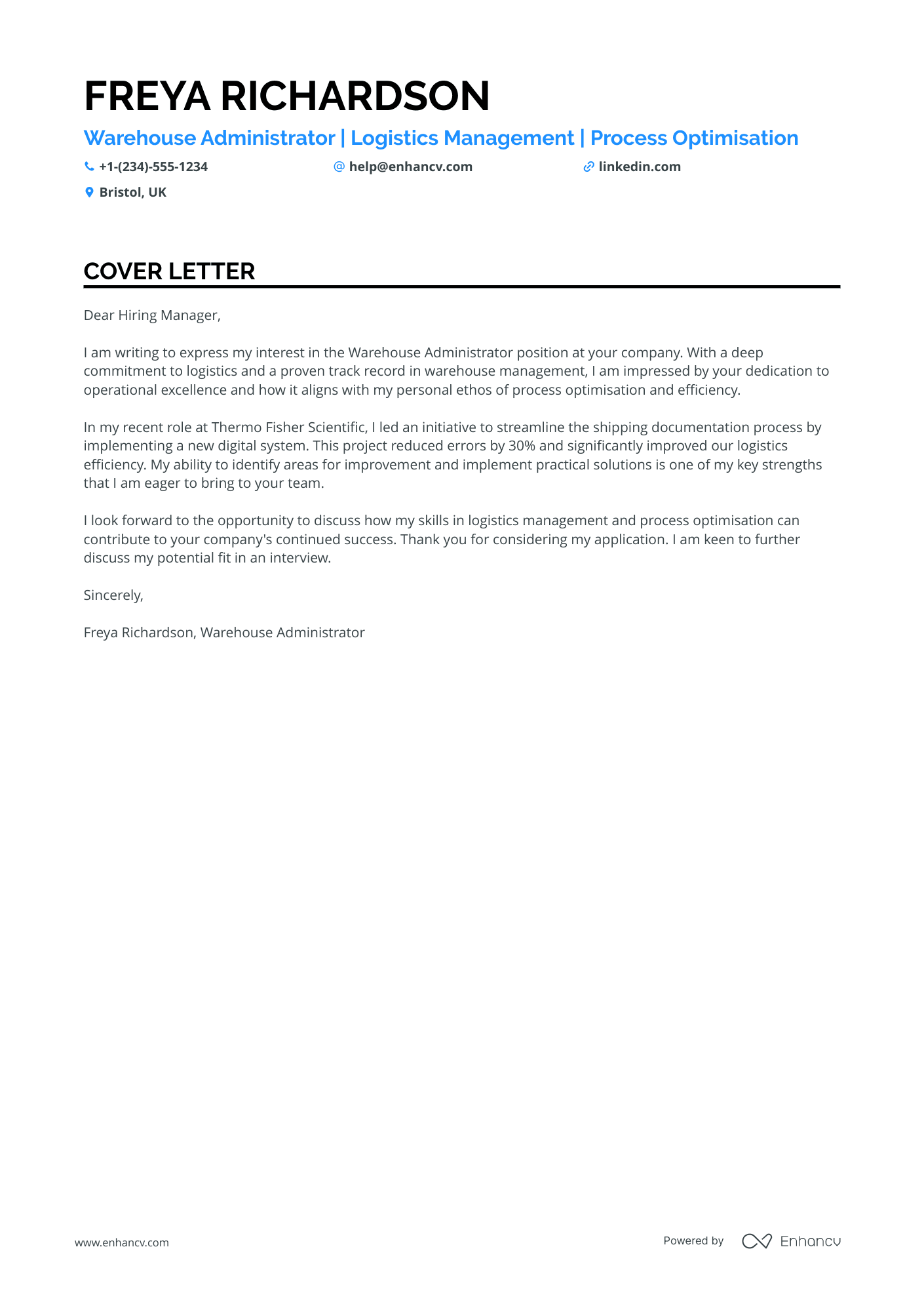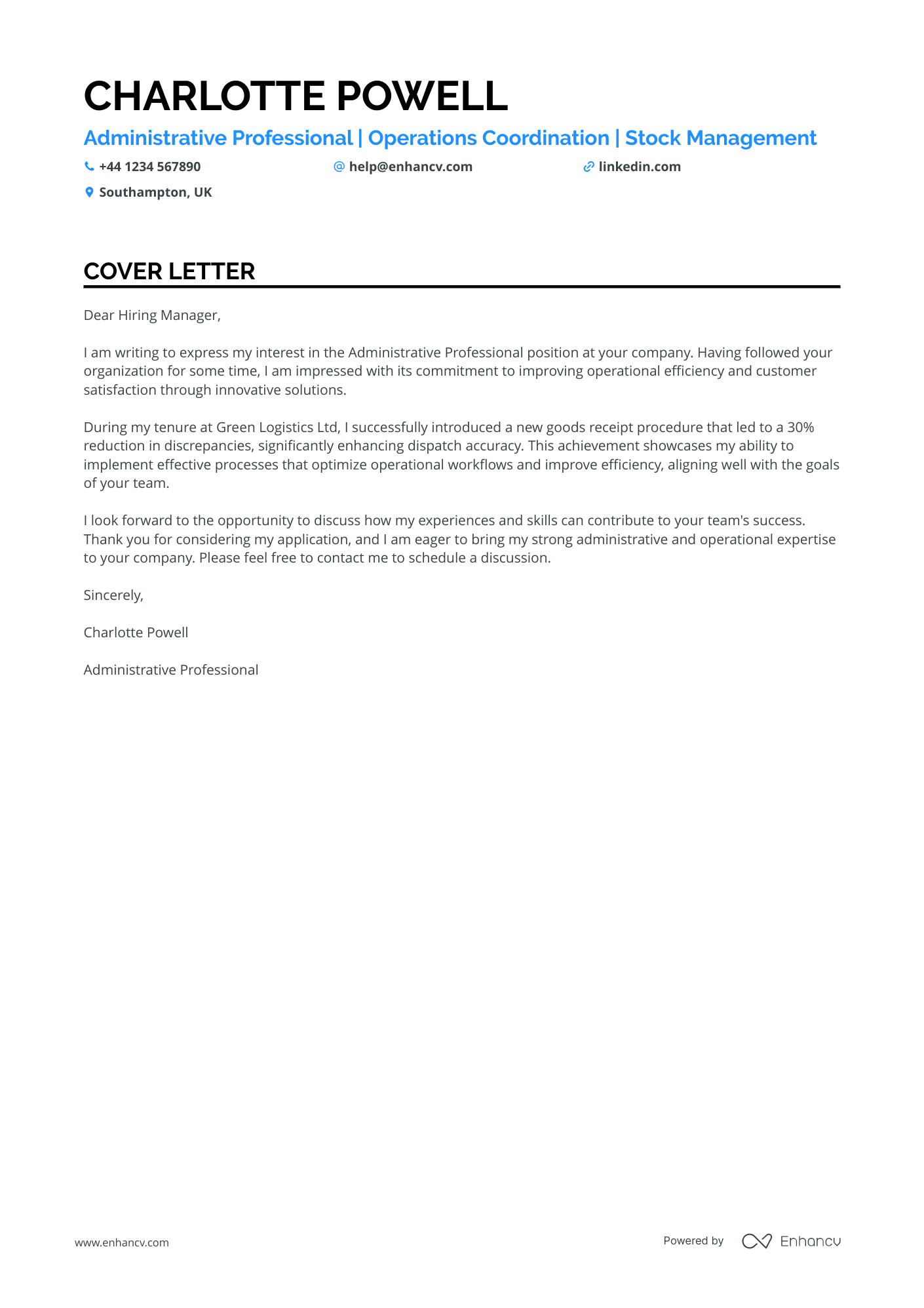You want your cover letter to strike the perfect balance between being professional and showing some personality. But how do you achieve this?
If you write too formally, your tone may come across as stiff. If you're too casual, it may sound overly conversational.
While modesty is always valued, how can you confidently present your skills without sounding arrogant or boastful?
This guide will help you find the right balance, ensuring your cover letter is both professional and personable, while focusing on the key job requirements.
Cover letter examples for warehouse
By Experience
Warehouse Assistant
- Highlighting Relevant Experience: The cover letter effectively emphasises Isabelle's extensive background in warehouse operations and logistics, detailing roles held at Travis Perkins, Balfour Beatty, and Wolseley UK. This showcases her proven expertise and suitability for the role of Branch Warehouse Assistant.
- Demonstrating Impact: Specific achievements, such as a 15% reduction in stock discrepancies and a 30% decrease in workplace incidents, are highlighted. This quantifiable data demonstrates her ability to positively impact business operations and safety.
- Showcasing Relevant Skills: The cover letter includes skills directly related to the role, such as Inventory Management, Safety Protocols, and Customer Service, indicating her capability to meet and exceed job expectations in a warehouse environment.
- Involvement in Training and Development: Isabelle's involvement in developing training materials and improving onboarding efficiency by 40% illustrates her commitment to team development and continuous improvement in workplace processes.
Warehouse Trainee
- Highlighting Relevant Experience: The cover letter effectively highlights the applicant’s direct experience with autoclaves, explicitly mentioning roles where they've contributed to maintenance and improved efficiencies, which is essential for a Trainee Autoclave Engineer.
- Emphasising Education: The applicant lists relevant educational credentials, including degrees in Mechanical and Biomedical Engineering, which bolster their technical foundation and align well with the medical technology focus of the job.
- Showcasing Achievements: The cover letter includes specific achievements such as leading efficiency improvement projects and developing safety protocols, showcasing the applicant’s ability to contribute positively to workplace operations.
- Demonstrating Technical and Soft Skills: The inclusion of both technical skills like troubleshooting and testing, alongside soft skills such as customer service and communication, presents a well-rounded candidate profile, crucial for the engineering role.
Junior Warehouse Associate
- Highlighted accomplishments in inventory accuracy and efficiency improvements, such as the 98% inventory accuracy at DHL and the optimisation of inventory processes, demonstrate expertise crucial for a Junior Warehouse Technician position.
- Emphasised problem-solving and communication skills by detailing enhancements in customer satisfaction and efficient inventory oversight, which are essential for roles involving customer service and collaborative environments.
- Noted achievements, like the Employee of the Month award and successful cost-saving initiatives, showcase dedication and innovative thinking, appealing traits for a candidate striving to contribute to business goals.
Entry Level Warehouse Operative
- Highlighting Certifications: Ava's cover letter effectively mentions advanced certifications such as the Advanced Forklift Operations, highlighting her qualifications for safe and precise forklift operations, crucial for the Warehouse Specialist role.
- Emphasising Achievements: The letter effectively quantifies significant achievements such as a 20% reduction in order errors and a 30% decrease in workplace incidents, underscoring Ava's impact in improving operational efficiency and safety.
- Demonstrating Leadership Skills: The experience section showcases Ava’s leadership in managing teams, improving productivity metrics, and reducing operational costs, valuable attributes for roles demanding team collaboration and efficiency.
- Focusing on Relevant Skills: The cover letter aligns Ava's skills such as Inventory Control and Safety Protocol Implementation with the key responsibilities of a Warehouse Specialist, ensuring that her capabilities are well-highlighted for the role.
By Role
Warehouse Manager
- Emphasise Leadership and Team Management: The cover letter highlights Rosie's experience in leading and motivating teams in various positions, which is crucial for a Warehouse Team Manager role.
- Highlight Operational Efficiency Improvements: Demonstrating achieved results such as a 15% cost reduction and 25% productivity improvement can substantiate one's ability to enhance operations.
- Showcase Continuous Improvement and SAP Experience: Expertise in implementing process improvements and proficiency in SAP are key competencies for managing warehouse operations effectively.
- Focus on Achievements and Outcomes: Including quantifiable results such as reducing staff turnover and enhancing delivery timeliness communicates value and effectiveness in the role.
Warehouse Operative
- Emphasis on Experience and Leadership: The cover letter highlights over five years of logistics experience, showcasing key leadership roles such as leading a team of 20 staff at DHL, which is crucial for a Warehouse Specialist role.
- Focus on Operational Achievements: Mentioning specific achievements such as improving stock accuracy by 30% and reducing operational costs by 20% demonstrates the applicant's ability to enhance efficiency and contribute positively to the organisation.
- Relevant Certifications and Education: Listing certifications such as the Advanced Warehouse Operations Certification and a postgraduate degree in Logistics and Supply Chain Management from a reputable institution underscores the applicant's qualified expertise in the field.
- Important Skillset and Safety Compliance: Skills like safety compliance, forklift operation, and logistics management further emphasise the applicant's proficiency, which is essential for maintaining safe and productive warehouse environments.
Warehouse Associate
- Highlighting leadership accomplishments, such as leading a 15-member team at Unilever, showcasing the ability to manage and elevate team performance is crucial for a Warehouse Operations Specialist role.
- Emphasising experience in implementing efficiency and safety improvements, like the digital logging system and new safety protocols, provides tangible evidence of impacting warehouse operations positively.
- Incorporating specific achievements, such as a 15% cost reduction project and replacing stock control systems, demonstrates a strong focus on operational efficiency and cost-management skills.
- Including relevant certifications and courses, such as Advanced Warehouse Management Techniques with distinction, signals ongoing professional development and a commitment to industry standards.
Warehouse Clerk
- Emphasising Relevant Experience: The cover letter highlights Leo's 7 years of experience in processing and operations, which is directly applicable to the desk clerk role and demonstrates sector-specific knowledge.
- Showcasing Technical Skills: It mentions proficiency in Excel, an essential skill for managing inventory records and improving data accuracy, showcasing attention to detail crucial for the role.
- Quantifying Achievements: The cover letter provides specific examples of improvements made (e.g., increasing operational efficiency by 15%) to demonstrate the candidate's ability to add value to the organisation.
- Broadening Functional Expertise: The inclusion of cross-departmental collaboration and communication improvements underscores the candidate's organisational skills and capability in enhancing operational processes.
Warehouse Picker
- Quantifiable Achievements: The cover letter effectively uses metrics and percentages to demonstrate the candidate's success in previous roles, such as achieving a 20% increase in picking accuracy and reducing workplace incidents by 30%.
- Relevant Certifications and Courses: Highlighting certifications such as "Advanced Warehouse Operations" and "Health and Safety in Logistics" showcases the candidate's commitment to professional development and industry standards.
- Leadership and Team Management Skills: Emphasising experience in leading teams, like managing a team of 15 warehouse operatives, underscores the candidate's capability in leadership roles within warehouse and logistics environments.
- Focus on Efficiency and Process Improvement: Demonstrating a track record of process optimisation, such as streamlining inventory processes and revamping storage layouts, highlights the candidate's problem-solving skills and initiative.
Warehouse Packer
- Highlighting relevant experience in warehouse management, including quantitative achievements such as improving order accuracy by 25% and reducing dispatch time by 20%, which demonstrates measurable impact in past roles.
- Emphasising advanced education in supply chain management, specifically a Master's degree from a reputable university, which adds credibility to technical expertise and industry knowledge.
- Inclusion of critical skills like forklift operation and safety compliance shows readiness to operate and manage warehouse equipment, vital for a warehouse operations specialist.
- Showcasing additional courses and certifications, such as Forklift Safety and Operations and Warehouse Management Advanced Tactics, reinforces specialised knowledge and continuous professional development.
Warehouse Dispatcher
- Highlighting Certifications: The cover letter effectively emphasizes specialised certifications, such as the "Certified Automotive Parts Specialist," which aligns with the technical requirements of a Parts Dispatcher role.
- Emphasising Key Achievements: It clearly mentions quantitative achievements, such as a 25% increase in order accuracy and a 30% improvement in logistics efficiency, demonstrating the candidate's impact and capability to excel in similar tasks.
- Demonstrating Experience and Skills: The letter succinctly showcases relevant skills and experiences, like warehouse management and logistics coordination, which are essential for the Parts Dispatcher position.
- Industry-specific Passion: By expressing passion for automotive advancements and tech innovations, the candidate shows a genuine interest and ongoing engagement with the industry, which is appealing to potential employers.
Warehouse Inventory Controller
- Highlighting Relevant Experience: The cover letter effectively summarises the candidate's experience in roles related to inventory control and warehouse administration, detailing specific tasks like inventory audits, stock transfers, and resolving discrepancies, which are highly relevant to the desired role.
- Showcasing Problem-Solving Skills: The candidate emphasises their ability to solve issues by detailing achievements such as implementing new auditing processes that decreased discrepancies by 20%, showcasing their proficiency in problem-solving within the supply chain arena.
- Emphasising Certifications and Education: Mentioning the completion of related courses and certifications, like the "Advanced Warehouse Management Systems" and "Professional Inventory Management," alongside degrees in Business and Supply Chain Management, bolsters the candidate’s qualifications for the role.
- Demonstrating Leadership and Impact: The letter notes leadership in training and development of teams, as well as leading projects that resulted in operational improvements such as increased efficiency in stock transfers and enhanced data integrity, indicating the ability to lead and positively impact the organisation.
Warehouse Stock Controller
- Highlighting Industry-Specific Certifications: The inclusion of courses like the 'Advanced Warehouse Management Systems' certification and 'Inventory Optimisation Certification' demonstrates a commitment to continuous professional development and relevance in supply chain management.
- Quantifying Achievements: The cover letter effectively uses quantifiable achievements, such as a "20% improvement in stock accuracy" and "30% enhancement in productivity," to illustrate the candidate's impact in previous roles, which is critical for roles focused on efficiency and accuracy.
- Showcasing Leadership & Training Capabilities: Experience in training team members and leading initiatives, as evidenced by training "10 team members on advanced stock analysis techniques," underscores leadership skills crucial for senior positions in stock control and logistics.
- Emphasising Technical Skills: The candidate's expertise with warehouse management systems and stock reconciliation is clearly illustrated, aligning with the technical demands of stock control and inventory management positions.
Warehouse Fulfilment Specialist
- Highlighting Key Achievements: The cover letter effectively showcases Matilda's significant achievements, such as a 40% improvement in service levels and a 50% reduction in complaints, which are crucial for a role focused on optimisation and quality in logistics.
- Relevant Certifications and Courses: Emphasising a specialised course like "SAP ERP Logistics Functionality" demonstrates her commitment to staying updated on industry standards and technologies, which is essential for a Fulfilment Specialist role.
- Specialised Skills and Tools: Mentioning expertise in SAP Systems and supply chain optimisation highlights her technical competency and relevance to logistics and operations management, catering well to the specific demands of the role.
- Demonstrated Passion Areas: The mention of interests in sustainable logistics and data analysis aligns her personal passions with professional roles, indicating a potential for infusing innovative practices with enthusiasm for environmental and data-driven solutions in the organisation.
Warehouse Logistics Coordinator
- Highlighting the effectiveness in streamlining logistics processes, such as a 20% gain in operational efficiency at GlaxoSmithKline, demonstrates capability in enhancing company operations.
- Emphasising achievements in compliance, like successfully maintaining a 98% success rate in export documentation compliance, positions the candidate as a reliable asset for regulatory adherence.
- Detailing the creation of comprehensive reporting systems and its impact, such as reducing response times by 40%, exemplifies strong problem-solving skills and ability to drive communication efficiency.
- Showcasing leadership in developing training programs, which resulted in a 25% reduction in shipping errors, highlights a proactive approach to boosting team performance and operational accuracy.
Warehouse Material Handler
- Highlighting specific achievements such as the 20% increase in logistics efficiency through process optimisation can greatly demonstrate the ability to make impactful improvements.
- Emphasising hands-on leadership experience, like leading a team to enhance stock control procedures, can effectively showcase management capabilities relevant to the role.
- Mentioning certifications such as the Certified International Supply Chain Professional can be crucial in emphasising subject matter expertise for a logistics-focused role.
- Detailing contributions to safety and compliance, such as implementing safety protocols that reduced accidents by 40%, can underscore a commitment to maintaining high operational standards.
Warehouse cover letter example
Charlotte Powell
Southampton, UK
+44 1234 567890
help@enhancv.com
- Highlight Relevant Achievements: The cover letter effectively mentions a successful initiative (30% reduction in discrepancies) that directly aligns with the expected outcomes of an Administrative Professional, showcasing the candidate's ability to improve operational efficiency.
- Alignment with Company Goals: The letter expresses understanding and alignment with the company's core values and objectives, such as improving efficiency and customer satisfaction, which demonstrates the candidate’s proactive approach and enthusiasm for the role.
- Focus on Key Skills: By emphasizing skills like process optimization and operational expertise, the candidate highlights the core competencies essential for administrative roles, making a strong case for their fit within the team.
- Professional Tone and Structure: The use of a clear structure and professional tone maintains the reader’s attention and effectively communicates the candidate’s interest and qualifications for the position.
Importance of cover letters in the United Kingdom
A well-crafted cover letter can significantly strengthen your job application by emphasising why you’re an ideal fit.
Here are some reasons why it matters:
- Personalisation: Employers expect your cover letter to demonstrate how your skills and experience align with the company’s needs and/or values.
- Addresses what is omitted from your CV: If your career path includes gaps or changes, your cover letter is the best place to address these positively and explain their relevance.
- Opportunity to stand out: Many applicants have similar qualifications, so a tailored cover letter can show your unique attributes and experience.
What UK employers expect from a cover letter
A great cover letter can set you apart when applying for jobs in the UK.
Follow these tips to ensure you make a strong impression:
- Research thoroughly: Spend time delving into the company’s website, social media, and industry news to understand their projects, awards, and future plans. The more specific your knowledge, the better you’ll be able to demonstrate your suitability for the role.
- Reflect their values: Every UK company has its own set of values that guides their culture. Once you’ve identified them, make sure your cover letter reflects how your values and work ethic align with theirs. If they’re known for integrity, emphasise your commitment to ethical practices.
- Tailor your skills: Focus on aligning your most relevant skills with the job description. Look for key terms and priorities mentioned in the advert, and make sure to provide examples of how you excel in those areas.
How to format a warehouse cover letter
To get your cover letter's formatting right:
- Use a modern font like Lato, Raleway, or Chivo, rather than the overused Arial or Times New Roman.
- Set your cover letter to be single-spaced with 1-inch (2.5 cm) margins on all sides—our templates are automatically set up for you.
- Ensure both your CV and cover letter are consistent in font style and formatting.
- Always send your cover letter as a PDF to prevent alterations and preserve its layout.
When it comes to structuring your cover letter, follow this sequence: begin with your address and contact details, then the employer's details (i.e. name and address), and the date. Next, start with a personalised greeting, followed by your introductory, body, and closing paragraphs. Be sure to include a sign-off and your signature at the end.
Remember, although Applicant Tracking Systems (ATS) software, which may scan your CV for keywords, won't read your cover letter, it will be reviewed by recruiters.
No time for a cover letter? Use our free cover letter generator and craft one effortlessly from your resume.
How to write your warehouse cover letter salutation
In a world of AI and instant prompts, taking the extra time to personalise your cover letter truly makes a difference.
Address the hiring manager directly with a customised greeting (e.g., 'Dear Mr Bond', 'Dear Ms Penny').
You can often find their name on LinkedIn (under the job listing or by searching) or in the ‘About’ or ‘Meet the Team’ section of the company's website. If in doubt, you can also contact the reception for assistance.
If you can't find the name, rather than using 'Dear Sir or Madam', opt for something more personal, such as 'Dear [Company Name] Hiring Manager'.
How to write your warehouse cover letter intro
One of the best ways to grab a hiring manager's attention? Show them the unique value you'd add to the team.
Review the skills or requirements listed in the posting and draw connections to your previous work experiences.
Focus on specific (and quantifiable) accomplishments and qualifications that align with the job description to make a strong first impression.
How to write your warehouse cover letter body
Your cover letter body is the most spacious and vital part of this document—it highlights your true value and the impact you can bring as a candidate.
Remember, your cover letter serves a different purpose to your CV. Here, you need to show your skills in context by telling the story of one significant achievement, hinting at how you’ll help your future employer achieve their goals.
So, when writing your cover letter body:
- Use concrete achievements to demonstrate your personality and impact.
- Support your achievements with quantifiable data and metrics.
- Tell the story of a successful project you’ve worked on and explain how you contributed to the outcome.
- Highlight both hard and soft skills to make your story more engaging.
- Focus on skills that are most relevant to the role and align with the company’s needs.
How to write a closing paragraph
There’s a wrong and a right way to close your cover letter. Here’s how.
The wrong way is to end with a signature or a formal 'Thank you in advance.'
The right way is to either promise how you’d make a positive impact on the company or ask when you can expect a response. This will highlight you as a forward-thinking candidate who’s enthusiastic about securing the role.
Conclusion
Your cover letter is an opportunity to showcase your personality and skills to potential employers. Start by addressing the hiring manager by name and tailoring your content to reflect the role’s requirements.
Include a specific example of your greatest achievement to illustrate your suitability for the position, while also expressing your enthusiasm for the company. Remember to format your letter professionally, ensuring it aligns seamlessly with your CV.
